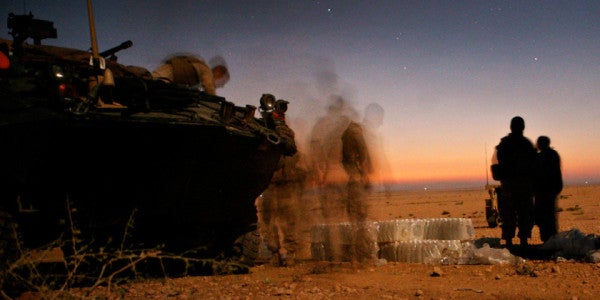How Should We Carry The Emotional Weight Of Squandered Campaigns?
Although thousands of miles separate Kunduz, Fallujah, and Saigon, these cities are metaphysically connected by the collective emotions of the...

Although thousands of miles separate Kunduz, Fallujah, and Saigon, these cities are metaphysically connected by the collective emotions of the U.S. veterans who served in each location. It is nearly impossible for veterans and those currently serving in the military not to feel strongly as they observe local security forces squander past investments made with periodic deposits of blood and sweat.
When the public sees fleeing refugees in lands far away, charitable donations and empathy flow like water. When veterans and active service members bear witness to the same terrible things in places with names like Sharqat and Sangin, the feelings can range from frustration, to anger, to sadness, to a profound sense of loss. How should these emotions inform, if at all, the ongoing debate over escalating involvement against the Islamic State and the wisdom of a leaving 5,500 troops behind in Afghanistan beyond 2016?
Conventional wisdom would have us believe that emotions negatively impact decision quality, but it turns out that without emotion, decision making is impossible. At the most basic level, these emotions, particularly negative ones, signal when and what kinds of situations we want to avoid. And negative emotions, such as the reflective sadness evoked by Kunduz and Fallujah, can open us up to new learning opportunities, as some researchers have found. Emotions are, after all, information about our environments and unnecessarily discarding relevant information can be detrimental to future decisions.
We should also acknowledge that emotions can push us toward counterproductive actions. While it is natural to want justice and accountability after feeling angry, untargeted rage and the desire for retaliation can generate more terrorists and insurgents than bombs could ever eliminate. Anger generally makes decision makers more open to risk while fear makes them risk averse. Being armed with knowledge about these tendencies can help us calibrate the right course of action going forward instead of rushing to a decision that ultimately backfires. For veterans, finding outlets, such as helping former interpreters resettle safely in the United States, can focus their emotional energies in productive ways.
The uneasiness of veterans should also inform the calculus of decision makers seeking easy answers — those who see force as the remedy for any unrest and uncertainty. Certainly, choosing the military option can feel empowering. But reality is much less satisfying; to offer a response to Gen. David Petraeus’ famous line, “Tell me how this ends,” we don’t know how this ends, or even if there is something we would call an ending. Even the former chairman of the Joint Chiefs, Gen. Martin Dempsey, who has deep experience and expertise in counterinsurgency and security force assistance, doesn’t know if it is possible to build an indigenous force that will stand up on its own. Making smart choices in the face of strong emotional motivations means being okay with unsatisfying answers.
The recent Taliban attack on Kunduz and last summer’s capture of Fallujah by terrorist forces, seemed, as the late great Yogi Berra might have put it, like emotional “deja vu all over again.” This year is also the 40th anniversary of Saigon’s fall. Vietnam, Iraq, and Afghanistan veterans and service members are connected by shared feelings — as David Shipley put it, a “tension between a sense of virtue and a sense of shame.” In other words, we did our best, for our brothers and sisters in arms, yet look at the way things turned out. These emotions have not only not led us astray, but they have led us to ask the hard questions in the first place.
From that deep well spring, we should find the courage to seek the answers to the question of whether we think committing more U.S. and coalition troops in Iraq and Afghanistan is a good idea or not. Perhaps then we can seek a place of balance between headstrong ambition and deep disillusionment that is the starting point for smartly using force and in full consideration of the human costs.